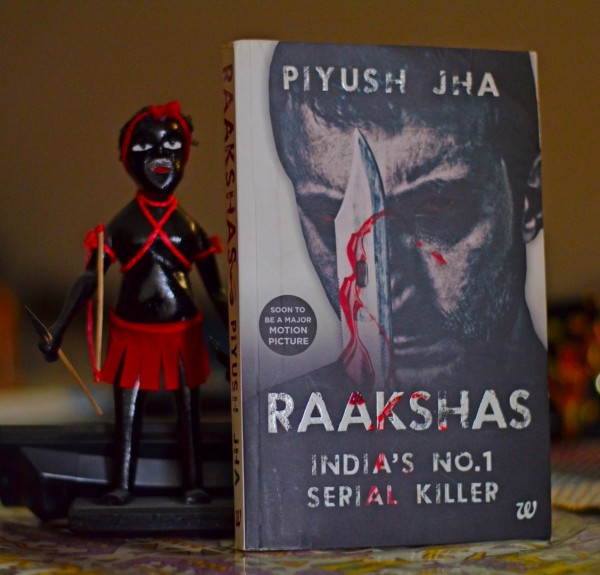Deep inside you’re a good man. Review of ‘Raakshas’ by Piyush Jha
Getting inside the mind of a killer makes for an engrossing topic for an essay… but if the writer happens to be Piyush Jha, the film-maker, the visualisation of how this happens gets a bone-chilling clarity.
‘Raakshas’ by Piyush Jha is a book that graphically traces the way the synapses in the brain fuse with each other and we are able to see distinctly how the ‘amygdala, which is the emotional centre of the brain, hijacks the pre-frontal cortex, which is the rational side’ and the story woven around this man who claims that ‘generations of my family were known to be quite courageous with written and spoken words, they were perhaps not as fearless when faced with dangers of the physical kind’ is all about how he evolves into ‘the mundi-cut killer’ obsessed with becoming the ‘Serial Killer No.1’. Coming after ‘Mumbaistan’, ‘Compass Box Killer’ and ‘Anti-Social Network’, Piyush Jha has written another book that is difficult to leave once you’ve begun reading it.
The narrative is never beyond belief even when it meanders through the gory details of the way a killing is planned or accomplished. One of the finer parts in the book are those when the reader comes face to face with the killer sharing the unsettling details of the way a killer needs to plan: ‘…establish a legitimate identity… quickly change it to another… stay under the radar by not making any lasting relationships… survive on his own… answer a policeman’s pointed questions and lead them away from understanding the full nature of the crime… turn on the charm when required, to trick women into believing him enough to literally follow him to their deaths…’
By the way, the killer that Maithili Prasad, the Additional Commissioner of Police decides to hunt down and puts an end to the terror he unleashed wasn’t born as one. She lets us into more insights into the way killers think and function and remarks: ‘How I wished to God that we would have all kept quiet and let him disappear silently into the night. Yet, I also realised that it was in his nature to kill and sooner or later his natural instinct would take over him and he would strike out without caring whether it was at a loved one or not.’ Maithili Prasad also realises at one point ‘that all the training and the best equipment are nothing in front a determined and vicious individual.’
The reader is also thoughtfully taken through the heart-wrenching ordeals that the killer had to face as a child and even then he was never ‘thinking of anything like escape. He was scared out of his wits and remained as quiet as a mouse, day in and day out, in an attempt to survive his ordeal.’ In the afterword the writer tells us that ‘most serial killers have had an extremely disturbed childhood. The turmoil experienced during those tender years has a far-reaching resonance that extends throughout their lives.’ As a proof of all his conclusions while researching and writing this novel, Piyush Jha has included a bonus section in the book that lists out and gives a short description of the sort of lives that India’s least-known serial killers have had. It is these parts that are vital for a reader because mere stories sometimes tend to be forgotten faster than those that come with documentation talking about the validity of the sort of character chosen for a work of fiction. These sections turn mere fiction into a real fiction.
All the time that I was reading the book I was travelling with this killer as he went about his devious ways to ‘spot the anomaly in the crowd’ and agreed with him as he mused about ‘two completely different people inside him. One, who grew to become super-efficient at dismembering the dead victims without an iota of regret, and the other who believed that Kalantak’s view of women was grotesque.’ What more can a writer want than a reader’s sub-conscious submerged in the pages he has written… and to have him travel with his character to try and understand the truth behind the mind that kills.
The book is as much about the killer and killings as it is about those who get killed. If you think that the ones who were the victims got a shabby or superficial treatment, you’re off the mark. This is one book where each victim is a character that a reader can literally want to shake and say, ‘Hey! Open your eyes, you are being led into a trap!’ But the killer is always smarter and knows ‘that moment, when the light caught her eyes, that I saw her expression. It had admiration and adulation, but there was something else too. It was belief; pure, innocent belief.’ It is this belief that converts them into victims.
The book is vicious and races on at an equally vicious pace… and I am glad that I decided to read this one.
.
Book details:
Title: Raakshas
Author: Piyush Jha
Publisher: Westland Ltd
ISBN: 978-93-85724-20-6
Price: Rs 295/- (in 2016)
.
.
.
You cab buy this book here:
Amazon: Raakshas: India’s No.1 Serial Killer
Flipkart: Raakshas: India’s No. 1 Serial Killer (English)
.
.
Arvind Passey
12 April 2016









